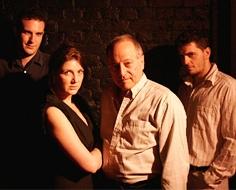Human Remains
The Canal Café Theatre is in an idyllic location, London's own Little Venice. The production currently being played inside the theatre however, is of a different nature. Set fifty years after the Spanish Civil War, it tells the story of the only surviving British man to fight for the Fascists. While hundreds of British fought, only six went to battle on the side of the Fascists. As he struggles with his very human emotions - guilt, fear and denial - he tries to explain the situation to his daughter, son-in-law and a young British journalist, waiting for an absolution that he knows will never come. However, as with everything, there is no clear black and white morality tale here and it is the grey area in between that makes this play interesting.
What are the consequences of the actions taken at age eighteen? For some they hold more gravity than others. Although those decisions and actions should not go on to control and oppress the rest of your life, the truth is that in this case at least, they did. It is worthy of note that although the protagonist of this story clearly regrets his action he never states that it was wrong - in a way doing so would make everything trivial. As he rightly points out, how can he have the right to change his mind when those who died so young no longer have that right? As he makes his account, there is an overwhelming feeling of insignificance, if he had chosen the other side would it have saved any lives? Probably not. Moreover, in 1936 nobody knew what the costs of Fascism would turn out to be, as he says even the Bishops were on his side. With hindsight it is easy to judge and older and wiser he does understand that: "the problem with ideology is it doesn't count bodies." Although the innocence of youth is an easy excuse, the play demonstrates that even half a century later, the actions taken continue to have very real consequences and cannot truly be put to rest as long as there is the memory of those who died.
This is a sound performance by Saul Reichlin as the Old Man, who although he is allowed to tell his story, is never released from guilt but neither is he condemned. The script is well-written and doesn't fall into the trap of moral superiority, leaving the audience to make their own judgments. A few less sound recordings might have been beneficial, instead of heightening the tension the sound of birds chirping and bombs exploding only distracted from the severity of the situation. Altogether, this is by no means a ground-breaking piece of theatre but it is an interesting take on a complex subject and an intellectually stimulating hour and a quarter of theatre.
(Chloe Preece)
Originally published on
